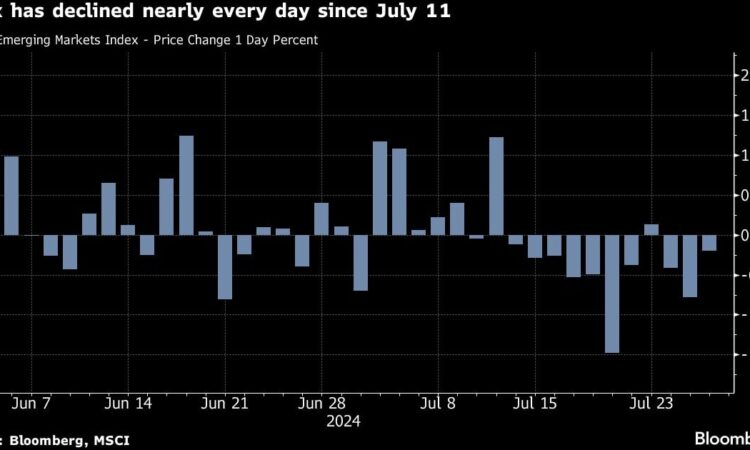
(Bloomberg) — Developing-nation assets suffered their first back-to-back weekly loss since May, pulled lower by lingering concerns around the Chinese economy and a rout in technology stocks.
MSCI’s stock index closed down 0.2% Friday, capping off a 1.6% loss for the week, while a companion gauge for currencies weakened for the fourth time out of the past five sessions.
“Quite an eventful week as nervousness around EM has increased with a struggling China, while the US continues to show that it cannot be matched in consistent growth at the moment,” said Juan Perez, director of trading at Monex USA.
Traders are recalibrating bets, pondering what the candidacy of US Vice President Kamala Harris means for markets, Perez said. For emerging-market investors, US politics adds to concerns that include lackluster global earnings and jitters around China’s economy.
The stock of Taiwan Semiconductor Manufacturing Co. helped drag down developing-nation equities, which spilled over to currency markets where the Taiwan dollar and other Asian currencies have been weakening.
Emerging-market indexes added to losses on Friday even amid bets that the Federal Reserve will lower rates in September following US data that showed core personal consumption expenditures rose at a tame pace in June and consumer spending remained healthy.
Meanwhile, Latin American currencies had a sour week amid a rally of the Japanese yen — a major funding currency for carry trades involving the region’s FX. As of 4:30pm in New York, the Mexican peso steadied and the Brazilian real declined against the dollar.
“While short JPY positions are still significant, there is reason to believe the Latam portion of the trade has been meaningfully unwound,” JPMorgan Chase & Co. strategists including Anezka Christovova wrote in a note.
Equity Pressure
Citigroup Inc. strategists Luis Costa and Philip Yin said the impact of further global stock pressure on emerging markets will vary.
Historically, currencies such as the won, Chilean peso, and rupiah are more sensitive to equity portfolio flows, while high-yielding currencies like Brazil’s real, Mexico’s peso, forint, and rand respond more to bond funds.
“For Asia’s low-yielding currencies like KRW and TWD, which have significant exposure to tech and semiconductor-related equity flows, the pressure from equities may be more pronounced,” they said. “Higher US yields have increased demand for outbound investments, partially offsetting the effects of equity inflows and making these currencies sensitive to both US rates and tech equity performance.”
In bonds, China’s benchmark government bond yield fell to a record low, testing policymakers’ resolve to stem the move.
The central bank sees excessively low yields as endangering financial stability and weighing on the yuan. A Bloomberg survey had suggested 2.25% was a red line for the PBOC for the benchmark 10-year note.
Elsewhere, Paraguay’s credit score was lifted to investment grade by Moody’s Ratings, marking a victory for one of the fastest growing economies in South America.
©2024 Bloomberg L.P.





